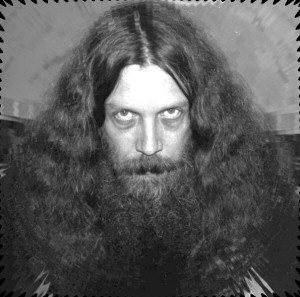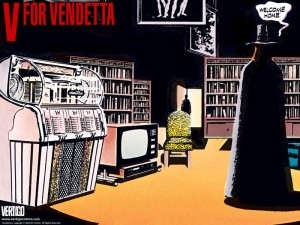
This series will focus on theories I have about loose ends, unanswered questions, and points of mysterious interest in various forms of pop culture. I won’t be focusing on any ongoing series, because guessing about things which may yet be answered isn’t of interest to me. For the most part, these answers are my own, and I don’t think they’re canonically true, but they usually have enough textual support to be plausible. I invite readers to bounce their own theories about these works around. Be aware that spoilers probably lurk within.
Anyone who has read V for Vendetta knows it’s one of those seminal Alan Moore books that was written at the top of his game, and indeed, there’s much to like. Considering the darkness and brutality of both the world and its protagonist, it’s rather optimistic, as opposed to his even-higher-regarded brethren Watchmen (though neither of them have anything on From Hell in terms of being dark and depressing). Indeed, I have at least one friend who considers V the superior book, but that’s a debate for another day. Nevertheless, it is a classic work, and one that has actually become inspirational in these crazy times.
The entire book, we are left to wonder just who V is behind his Guy Fawkes mask. Is he an important figure in the story? Is he a relative of Evey? In the end, of course, we never find out. It’s okay that we don’t, though. This isn’t a mystery that is crucial to the reading of the book, and, as Evey says, finding out who he is would probably diminish him, take away from the power of what he made himself into. V himself says that people can die, but ideas are bulletproof, and even though The Man From Cell V dies, the V persona lives on in his acolyte with almost no one the wiser. In the movie, it’s stated that V is all of us. He’s everyone who was ever oppressed and decided that they would no longer take it. Given all this, it’s almost certainly better that the story doesn’t reveal V’s identity, and if it were as simple as V never having had an identity at all, I could live with that just fine.
But funny enough, Alan Moore talks a little about this in the epilogue of the book. Despite his reputation these days as a grumpy old sorceror, it’s clear that Moore has quite a sense of humor. He teases that V does in fact have an identity, and it’s not Evey’s father. Then, in a work of classic villainy, he tells the readers he’s run out of space, so he can’t tell them.
Let it be known that I’m not one of those obsessive fans who simply has to know every detail of a work, down to the smallest minutiae or insult creators over every tiny plot hole or contrivance. If a story is enjoyable, or generally works, I am content to be along for the ride, forgive little mistakes, and not dwell overmuch on ambiguity. I’m even aware of Neil Gaiman’s mantra from Sandman, that it’s the mystery which lingers in our minds and the solution is always less satisfying. Despite all that, knowing Moore had someone in mind made me start to wonder who it might be. Alan Moore is one of those writers who doesn’t half-ass anything he does, which means that even if we readers were never going to find them, there must be clues.
I have in the past heard some fascinating theories on who V might be. Some have suggested that despite Moore’s claim to the opposite, V might be connected to Evey, and in fact be her father. Though there is some circumstantial evidence to suggest it, Moore’s denial as well as the fact that it’s about as trite an answer as possible lead me to be sure this is not the case. Others suggest that V might be Ruth, the girlfriend of V’s original cell neighbor, Valerie, out to avenge her lost love. I think this is an interesting theory, except that those few people who did know V’s identity addressed him as a him, so unless they were being particularly insulting towards her, I doubt it. V’s motivations are also far more idealistic and less personal. V never seems out for revenge (a mistake I thought the movie made). I even know one person who suggests that V is The Second Coming, put through the horrors and trials of Norsefire and driven mad, but still able to lead the people to salvation. I can’t really find any evidence that suggests this to me, other than the fact that V has nigh-superhuman abilities. It is kind of a cool idea to imagine a messiah tainted by evil but still out to do good, but I still don’t think that is the answer for me.
No, my theory is this: V is Alan Moore himself.
Am I implying that Alan Moore, arguably the greatest comic book writer of his time, wrote what people would today call a self-insert fanfic? I am not. I will get to what I believe his motivations were in a moment, but for now, I’ll focus on the evidence. Moore, like V, is brilliant, knowledgeable in many subject areas, and perhaps just a touch mad (I assume the drugs and tortures they subjected him to in the camp would have made him much crazier). Moore is also capable of extremely intricate wordplay even while just speaking, as anyone who’s ever heard an interview with him will attest, much like V, who gives entire monologues using alliteration or metaphors. He’s certainly the sort of person a fascist government would have thrown in prison, what with being a writer, a political anarchist, and known for his unconventional lifestyle (polyamorous marriage, bisexual, did lots of drugs). His anarchism certainly supports the direction V decided to take his revolution. Also, I will admit that I have not been to Alan Moore’s home (yet!), my guess is that it resembles V’s Shadow Gallery:
Naturally I can’t prove this part, but I strongly suspect it. If anyone who knows Alan out there can tell me, I would greatly appreciate it.
So, if my theory has any weight at all, why would Moore do this? Well, as anyone who knows anything about the book will tell you, Moore wrote the book as a response to Thatcherian England and the hardline conservative policies of the time. I can’t say if Moore truly believed his country was going to be overrun by fascism, but I suspect at least that he wondered about it, and what he would do in that event. So I believe that V for Vendetta is Moore’s countermeasure in case the blackshirts ever started marching into Northampton, a “break in case of Nazis” glass, if you will. And while it was his plan, turning it into a book meant that he could share it with everyone, and incite others to do the same. The moral of V, after all, is that tyranny and oppression and strike anywhere, even in our supposedly safe, rich countries, if we let them, but the only thing it would take to stop them is everyone being brave enough to say no. So I think, in a way, it’s a guide, with the author effectively living out the plan, that happens to double as a really cool story.


